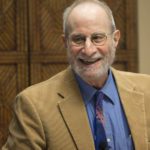By Dr. Joseph Chuman

“May you live in interesting times” is a saying attributed to the Chinese, but probably erroneously. But whatever its origins, its meaning is ironic. It is, in fact, a type of curse, wishing that its victim lives in times of trouble.
By the light of that adage, there is no doubt that we live in most “interesting” times. It is a time like none of us has ever experienced, a time of fear and anxiety, a time when we feel that an invisible enemy lurks and draws ever closer to smother us—any of us—with total indifference, in a blanket of illness and death. But we do not know whether it will be our very person or our neighbor. We walk very uncomfortably and cautiously through a landscape of uncertainty.
Nature will have last word
This pandemic caused by the coronavirus throws humanity up against our limits. Despite the vaunting achievements of modern science and technology, the threat that appeared suddenly out of nowhere reminds us of the fragility of the human condition. We are not as secure as we lead ourselves to believe that we are. We build mighty skyscrapers and deploy our cleverness to engage the most perplexing problems, but we can still be mortally threatened by an invasion of invisible microbes. Nature can still readily do us in. Perhaps covid-19 is a harbinger of what our medical authorities have been telling us for quite a while, namely that the pathogens that suffuse our environment, in their ability to rapidly mutate, are outstripping our antibiotics and antivirals to subdue them. Perhaps. But whatever the outcome of this war, nature, in the ultimate scheme of things, will have the last word.
Our researchers are working feverishly to develop a vaccine, and I am confident that this time they will. We will win this battle. But before a vaccine is developed, our best defense is the defense our ancient ancestors would have employed, namely to physically separate ourselves from each other, thus depriving the virus of another host and stemming the communication of the disease.
Maintaining a conscious distance
Hence, we have taken on “social distancing,” a practice that feels unnatural and strange. Some remain quarantined in their homes as if under self-imposed house arrest. Some venture out cautiously to the market or on other brief errands. But there is no touching, no warming hugs, no kisses on the cheek, no handshakes. Just the maintenance of a conscious distance between us and others. It frustrates our instincts.
This is so, I believe, because enforcing a distance between ourselves and others nurtures an appreciation for something we too readily take for granted. Too often we neglect the significance of something commonplace until we are forced to go without it. And in this case it is the importance of the human bond.
While different people value different things, and the diversity of experiences that we humans pursue in search of happiness seems almost infinite, I would wager that what brings happiness to most people over the long term is the love of others, friendship, being in community with others, and engaging comfortable feelings of warm, human connections.
No substitute for human presence
As human beings, we are very much social creatures and are most fulfilled through living our lives with others. And so we feel the yearning for one another across social distances. Humanist that I am, I believe there is no substitute for being in and feeling the physical presence of others, hearing the inflection of their voices, observing their gestures, apprehending their body language, sensing their passion and their laughter, sharing their physical space.
We in the Ethical Society and people across the world are fortunate that sophisticated technologies exist to help us bridge that physical gap today. But however clever these technologies, I think most people sense that they are but facsimiles that ultimately fall short of doing justice to the face-to-face of the human encounter, and we feel the powerful desire for the plague to end so that we can once again enjoy, unmediated, the company of other human beings whose presence enables us to feel most at home in the world.
These values, commonplace but essential to our fulfillment, are central to Ethical Culture and its humanist orientation. I’ll be exploring them further in my address of April 5th, entitled “Ethical Culture and Human Solidarity.” I look forward to seeing you then, even though most probably there will remain a physical distance between us.
Dr. Joseph Chuman is leader of the Ethical Culture Society of Bergen County.


